
IPPF works to ensure that every woman and girl has the human right to choose to be pregnant or not and we will continue to supply and support safe and legal abortion services and care. We are committed to reducing the number of deaths of women and girls who are forced to turn to unsafe abortion methods. Make Abortion Safe. Make Abortion Legal. For all Women and Girls. Everywhere.
Articles by Abortion Care
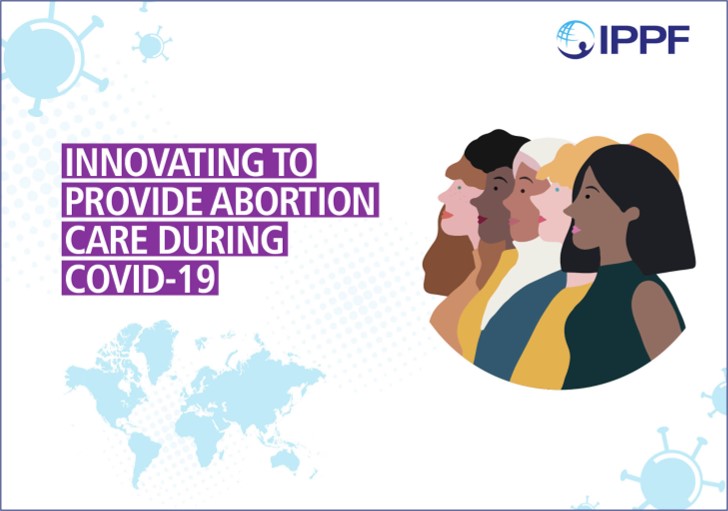
Innovating to provide abortion care during COVID-19
During the COVID-19 pandemic, women globally face compounded barriers to accessing safe abortion care. The de-prioritization of sexual and reproductive health services including abortion care, overwhelmed health systems, restrictions on movement and fear of visiting health facilities have all created additional challenges for women to safely end a pregnancy. However, recognizing the need to adapt to ensure women have access to the care they need, this crisis has sparked innovation among IPPF Member Associations. They developed new approaches to reach women with safe abortion information and care, while keeping women’s choice and quality of care at the centre of their work. This document illustrates some of the innovative approaches used to ensure continued access to quality abortion care during the pandemic.

In pictures: Innovating during COVID-19
Women around the world have faced multiple barriers to accessing safe abortion care during the COVID-19 pandemic including the de-prioritization of sexual and reproductive healthcare, overwhelmed health systems and restrictions on movement. The COVID-19 crisis has sparked innovation among IPPF Member Associations who responded swiftly by developing new approaches to reach women with safe abortion care including telemedicine and home-based provision of medical abortion. Strong evidence generated from this work supports the continuation and strengthening of these approaches beyond the end of the pandemic. Cameroon Cameroon National Planning Association for Family Welfare (CAMNAFAW) To ensure that quality abortion care can be provided to women during travel restrictions, CAMNAFAW’s service providers travel to partner clinics in underserved areas and to clients’ homes to provide medical and surgical abortion care. This model of taking safe abortion care closer to women will continue even with easing of travel restrictions, as this has been found to be an effective and acceptable approach to increasing access.Photo: IPPF/Xaume Olleros/Cameroon Share on Twitter Share on Facebook Share via WhatsApp Share via Email Guinea Association Guinéenne pour le Bien-Etre Familial (AGBEF) Building on lessons learned during the Ebola crisis in Guinea, AGBEF quickly took measures to prevent infection in its clinics to continue providing sexual and reproductive healthcare, including surgical and medical abortion, in a safe environment. AGBEF donated protective materials to communities, including hand-washing stations, face masks and antibacterial gel, alongside messaging on infection prevention. This community visibility reassures clients they can safely attend AGBEF clinics for abortion and contraceptive care.Photo: AGBEF/Guinea Share on Twitter Share on Facebook Share via WhatsApp Share via Email India Family Planning Association of India (FPA India) FPA India and partners advocated to have sexual and reproductive healthcare, including abortion, recognized as essential by the government, which meant FPA India could continue healthcare delivery during the national lockdown. To reduce in-person clinic visits, FPA India established teleconsultation and counselling for abortion care, and is continuing to provide in-clinic care for both medical and surgical abortion. Photo: IPPF/Alison Joyce/India Share on Twitter Share on Facebook Share via WhatsApp Share via Email Nepal Family Planning Association of Nepal (FPAN) FPAN and partners advocated for interim approval of home provision of medical abortion and telemedicine for abortion counselling during COVID-19. FPAN is now implementing these approaches, ensuring continued access to abortion care in Nepal, where many people live in remote locations with limited mobility, which has been further restricted by COVID-19 lockdowns. Photo: FPAN/Nepal Share on Twitter Share on Facebook Share via WhatsApp Share via Email Pakistan Rahnuma – Family Planning Association of Pakistan (Rahnuma-FPAP) Rahnuma-FPAP and partners successfully advocated for the government to class sexual and reproductive healthcare as ‘essential’, which enabled the team to continue providing post-abortion care during the pandemic. Rahnuma-FPAP expanded its telemedicine and home-based provision for menstrual regulation counselling and post-abortion care. These new approaches have ensured continued access to services for clients unable to reach clinics.Photo: Rahnuma-FPAP/Pakistan Share on Twitter Share on Facebook Share via WhatsApp Share via Email Palestine Palestinian Family Planning and Protection Association (PFPPA) In response to the government-mandated closure of its clinics, PFPPA quickly established a toll-free call centre which provides consultations, counselling, referrals and follow-up, including consultation for abortion care through a harm reduction approach, ensuring that women are provided with accurate information. Due to its success, PFPPA is exploring options for continuing this healthcare delivery model beyond the pandemic, with the aim of keeping it free of charge for users.Photo: SAAF/Samar Hazboun/Palestine Share on Twitter Share on Facebook Share via WhatsApp Share via Email Sudan Sudan Family Planning Association (SFPA) Following a nation-wide shutdown in April, SFPA established a call centre to increase access to healthcare, including abortion and contraceptive counselling and referrals. An unexpected outcome of the new call centre is that it has reached an increased number of young women who regularly call to discuss their reproductive health and rights. SFPA is working towards institutionalizing this model for continuation beyond the pandemic.Photo: SFPA/Sudan Share on Twitter Share on Facebook Share via WhatsApp Share via Email Togo Association Togolaise pour le Bien-Etre Familial (ATBEF) ATBEF adapted its mobile application ‘Infos Ado Jeunes’, adding a toll-free teleconsultation service for young clients to use to access abortion consultations and pre- and post-abortion counselling. This app has given young clients ongoing access to care when they face challenges travelling to clinics. It has also eased overall client flow in clinics at a time when social distancing is being implemented.Photo: ATBEF/Togo Share on Twitter Share on Facebook Share via WhatsApp Share via Email
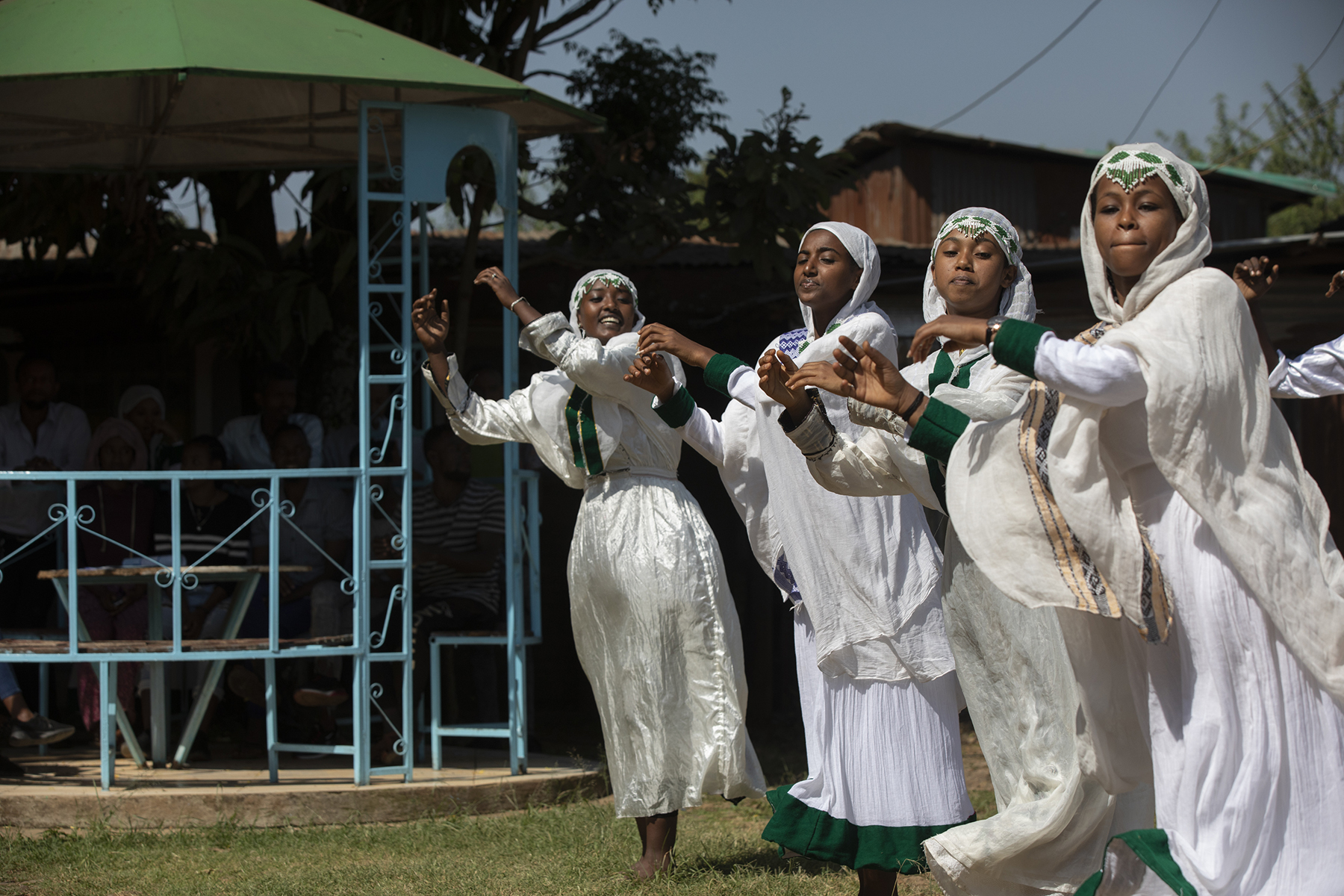
Youth-led sexual healthcare through dance, song, and poetry
In Ethiopia, getting young people’s attention about sexual and reproductive healthcare is no easy task. But at a youth centre in Jimma, the capital Oromia region, groups of young people are getting vital messages about sexual health and contraception out to their peers through dance, song, and poetry. Student Jumeya Mohammed Amin came here to train as a peer educator for sexual and reproductive health [SRH] three years ago, when she was 14 years old. In her community – a conservative village 20 km outside the city – early marriage and pregnancy was common, and information about SRH practically unheard of. Navigating traditional norms “Girls younger than me at the time were married. The youngest was only nine,” said Amin, who would watch her classmates have to leave their home, school, and playmates behind. In Amin’s community, to opt out of unintended pregnancies involves unsafe abortion methods such as remedies prescribed by traditional healers – which can be fatal. “I know one girl from 10th grade who was 15 years old, and she died from this in 2017,” she said. But Amin’s work educating hundreds of young people each year on sexual health has changed attitudes in her community around early marriage, unplanned pregnancy and the options available to prevent it, she says, with many of her peers now waiting to start becoming sexually active. Tackling high rates of teen pregnancy Oromia has the third highest rate of teenage pregnancy in Ethiopia, after the Afar and Somali regions, says Dessalegn Workineh, who runs the Jimma office of the Family Guidance Association of Ethiopia [FGAE], which is supported by IPPF. “In Oromia, out of this rate of teen pregnancies, almost twenty percent end up in abortion,” he said. The region also has the third lowest uptake of contraceptives among women aged 15 to 49. 17-year-old peer educator Mastewal Ephrem says that the problem comes down to a lack of information. “People don’t know about reproductive health and they need this information about how to manage their family, sex and infections,” she said. Religious and social conservatism make this difficult, especially in poor and rural areas where families receive dowries in the form of money and gifts when their daughters marry. “Because of not having confidence and not talking to people, girls are doing early marriage,” said Ephrem. Poverty and other hardships also push girls out of their family homes early and leave them in precarious situations, where they run a high risk of encountering abuse. “I see girls aged 10, 13 and 15, who live on the streets and take drugs,” said Emebet Bekele, a counsellor working at an IPPF-supported clinic in Jimma that is aimed at helping sex workers. Bekele provides counselling and testing for HIV and STIs. She talks to girls and women about the full range of free and confidential family planning services available at the clinic. “Sometimes we bring them from the streets and we test them. Most of them get pregnant,” she said. She often supports students to get safe abortion care; including girls as young as 13. Taking sexual healthcare to the streets The youth centre reaches a lot of young people in schools and directs them towards the youth centre, where there is a library and many group activities and performances to teach them about SRH. Groups of young people practice and perform short plays and dances about topics such as unsafe sex and STIs here, as well as on the streets, where they draw a crowd. Fourteen-year-old Simret Abiyu has turned what she has learned into SRH-themed poems that she pens and performs to her peers in English, Amharic and Oromo. “Sometimes I get training here and write poems about family planning and the work of FGAE and the development of the country,” she said. Healthcare and advice via the phone University student Nebiyu Ephirem, 26, is a youth leader at the centre. He has been managing the two SRH helplines – located in a quiet back office – since it started in 2017. He answers a lot of calls from young people asking about contraception or their bodies and people dealing with emergencies and tries to answer their questions or refer them to public, private or FGAE clinics across the country. “Culturally, people used not to want to discuss sexual issues. They fear discussing these openly with family, and due to religious beliefs, so people like to call me,” said Ephirem. The youth centre reaches more than 11,000 young people a year through its work at schools, and through outreach clinics located in coffee plantations, where many young people work. Currently, the youth centre uses the helpline, radio adverts and social media to inform people about sexual health. The team hopes that media campaigns can spread the message wider in order to raise awareness about young peoples’ sexual health needs.
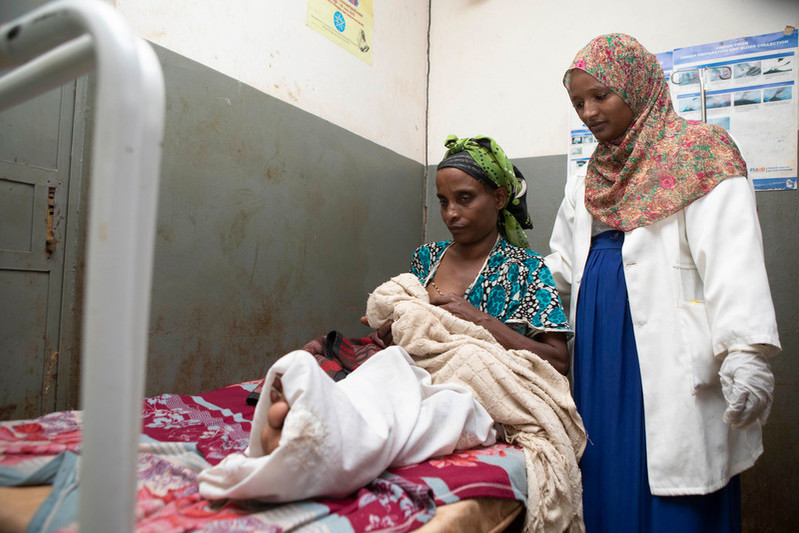
"Before, there was no safe abortion"
Rewda Kedir works as a midwife in a rural area of the Oromia region in southwest Ethiopia. Only 14% of married women are using any method of contraception here. The government hospital Rewda works in is supported to provide a full range of sexual and reproductive healthcare, which includes providing free contraceptives and comprehensive abortion care. In January 2017, the maternal healthcare clinic faced shortages of contraceptives after the US administration reactivated and expanded the Global Gag Rule, which does not allow any funding to go to organizations associated with providing abortion care. Fortunately in this case, the shortages only lasted a month due to the government of the Netherlands stepping in and matching lost funding. “Before, we had a shortage of contraceptive pills and emergency contraceptives. We would have to give people prescriptions and they would go to private clinics and where they had to pay," Rewda tells us. "When I first came to this clinic, there was a real shortage of people trained in family planning. I was the only one. Now there are many people trained on family planning, and when I’m not here, people can help." "There used to be a shortage of choice and alternatives, and now there are many. And the implant procedures are better because there are newer products that are much smaller so putting them in is less invasive.” Opening a dialogue on contraception The hospital has been providing medical abortions for six years. “Before, there was no safe abortion," says Rewda. She explains how people would go to 'traditional' healers and then come to the clinic with complications like sepsis, bleeding, anaemia and toxic shock. If they had complications or infections above nine weeks, Rewda and her colleagues would send them to Jimma, the regional capital. "Before, it was very difficult to persuade them to use family planning, and we had to have a lot of conversations. Now, they come 45 days after delivery to speak to us about this and get their babies immunised," she explains. "They want contraceptives to space out their children. Sometimes their husbands don’t like them coming to get family planning so we have to lock their appointment cards away. Their husbands want more children and they think that women who do not keep having their children will go with other men." "More kids, more wealth" Rewda tells us that they've used family counselling to try and persuade men to reconsider their ideas about contraception, by explaining to them that continuously giving birth under unsafe circumstances can affect a woman's health and might lead to maternal death, damage the uterus and lead to long-term complications. "Here, people believe that more kids means more wealth, and religion restricts family planning services. Before, they did not have good training on family planning and abortion. Now, women that have abortions get proper care and the counseling and education has improved. There are still unsafe abortions but they have really reduced. We used to see about 40 a year and now it’s one or two." However, problems still exist. "There are some complications, like irregular bleeding from some contraceptives," Rewda says, and that "women still face conflict with their husbands over family planning and sometimes have to go to court to fight this or divorce them.”
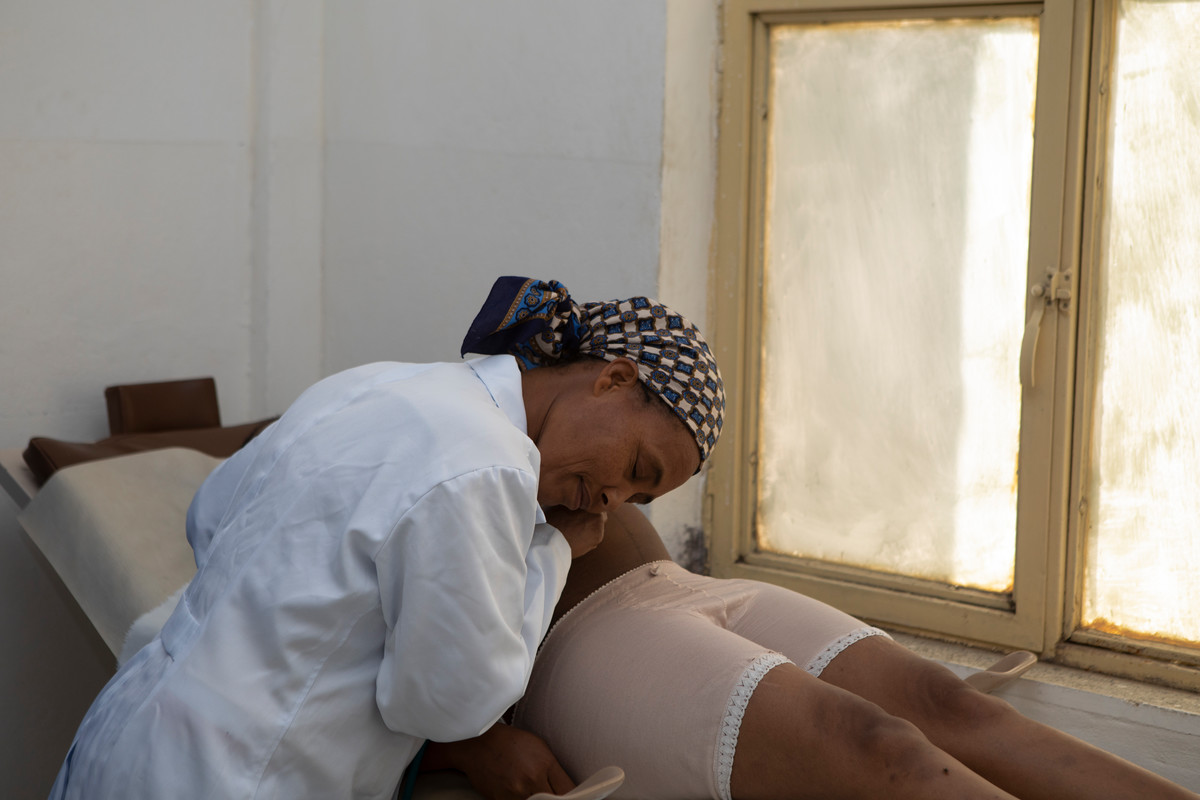
Delivering healthcare to women in rural Ethiopia
In a room that is bare but for a few beds, Kuzema Abba Naga is resting after giving birth hours before to her tenth child, and now she thinks, her last. Before coming from her village to this remote and rural government health center in the Kebele district to give birth, Naga never knew it was possible to choose when or whether to have a baby. “I am 38 years old and I had my first baby at age 15,” she said. “This is my first baby for eight years.” Naga named the baby Nejat, which translates to ‘liberation’, after giving birth and discovering the contraception options available to her, she decides to have an IUD fitted immediately. Lack of access to contraception in rural areas This is the first time midwife Rewda Kedir has fitted a woman who has just had a baby with an IUD, though it is not uncommon to meet women coming from rural areas who have never heard about family planning. When they do, many are interested in it, even if they have to fight their husbands to use it or they are forced to hide it from them. “They want contraceptives to space out their children,” said Kedir. “Sometimes their husbands don’t like them coming in to get family planning, so we have to lock their appointment cards away. Their husbands want more children and some think that women who do not keep having their children will go with other men,” she said. Kedir says that most women prefer using the contraceptive implants because they feel few side effects, are long-lasting, easy and painless to have fitted and to conceal. “Here, people believe that more kids means more wealth, and religion restricts family planning services,” she said. “Only 28 percent of women aged 15 to 49 use modern contraceptives,” says Dessalegn Workineh, who manages the Family Guidance Association of Ethiopia’s south west area office in Jimma. Expanding contraceptive access in Ethiopia With support from the Family Planning Association of Ethiopia (FGAE), who work with the Ethiopian government, clinics in remote rural areas like this one can now provide a full range of sexual and reproductive health (SRH) services for free. Having all the products and services available and under one roof makes it easier to reach people who might really benefit from help with family planning. In Oromia, 43 percent of women give birth at a health facility. Kedir finds a lot of women coming in for maternal and post-natal health services who she speaks to about family planning, end up staying or returning to get family planning services. “Before, it was very difficult to persuade people to use family planning and we had to have a lot of conversations. Now, they come 45 days after delivery to speak to us about this when they get their babies immunised,” she said. Staff at the clinic also provide family counselling to try and encourage men that contraception is a good idea for the whole family. “We tell them that continuously giving birth can affect the mother’s health and might lead to maternal death, damage the uterus and lead to long-term complications,” said Kedir. A number of staff at the clinic have been trained on family planning and can answer queries and deliver services, “So when I’m not here, people can help.” “The implant procedures are better because there are newer products,” said Kedir, who sits next to a handmade poster with the options for contraception glued on that still has the older, match-sized implants and the new, thinner implants. Providing comprehensive abortion care The clinic also provides comprehensive abortion care and for the past six years, medical abortions. This involves taking a pill rather than having vacuum aspiration or surgery, and is helping to stop women turning to unsafe abortion methods. “Before, there was no safe abortion. People would go to traditional healers and then come here with complications like sepsis, bleeding, anaemia and toxic shock,” said Kedir. “The good thing is that the women that have [safe] abortions get proper care and the counselling and education has improved,” said Kedir. In Ethiopia, these services are vital “to save mothers from dying due to cases of unsafe abortion,” says Workineh. “Working on comprehensive abortion care reduces complications and therefore maternal mortality,” he added. Kedir says women still have to fight their husbands to get access to family planning and cases can end up in court or divorce. But the cases of complications resulting from unsafe abortion have plummeted. “We used to see about 40 a year. Now it’s one or two,” she said.

The role of quality medical abortion during the coronavirus crisis
During the global COVID-19 pandemic, medical abortion has an increasingly important role to play in ensuring access to safe abortion care for those who choose not to continue their pregnancy. This healthcare crisis will put millions of additional women at risk of sexual violence, lack of access to contraception and unintended pregnancy. This, in turn, will significantly increase the need for access to safe abortion care. Access, however, is simultaneously decreasing, with clinics closed or working at reduced capacity, public health systems focusing on their COVID-19 response, and many governments not recognizing abortion as an essential health service. Fear of contracting COVID-19, coupled with government lockdown measures restricting movement, are also keeping women at home, preventing them from accessing essential SRH services, including abortion. The increase in demand, decrease in supply and restrictions on movement around the world are creating an environment in which we can expect to see a rise in unsafe abortion. Many IPPF Member Associations, therefore, are exploring and implementing alternate solutions to clinic-based abortion care, including supported self-managed medical abortion at home, community-based provision of medical abortion and a telemedicine approach that minimizes contact with service providers. Member Associations are also strengthening partnerships with government healthcare facilities, which have shifted their focus to COVID-19 response and are now referring abortion clients to Member Association clinics. In one African country, a government-imposed curfew required IPPF’s Member Association to temporarily suspend its clinics’ night-time opening hours, which meant reduced access for abortion care. “Many clients prefer to receive abortion services during the night, when we offer an on-call service,” explains the Programme Director. “This will certainly force clients to resort to clandestine and unsafe abortion practices.” This Association has responded by increasing access through new strategies, including community-based provision of medical abortion. The team has trained private service providers in the provision of quality medical abortion and is equipping them with medical abortion pills so that they can bring this essential service to women in their communities. With accurate information, quality medical abortion pills and effective follow-up and support, new or altered service delivery approaches are enabling women to access safe abortion care while maintaining social distancing and reducing the risk of COVID-19 transmission. It is vital that women’s experience of abortion and the quality of the care they receive is not compromised during this crisis. Medical abortion, whether self-managed or with the support of a health professional, should be undertaken using quality medical abortion pills and with accurate information available to the user. Quality pills will increase effectiveness and minimize the risk of complications and the need for subsequent clinic-based care. Now, more than ever, it is critical that women are able to access quality medical abortion commodities. With the COVID-19 pandemic causing global supply chain disruption, many providers of safe abortion care are finding themselves needing to seek alternate solutions to procuring medical abortion commodities. IPPF is improving access to information and visibility on the availability of quality medical abortion pills by country. Our Medical Abortion Commodities Database contains information on medical abortion products in 100 countries, including 20 brands of quality misoprostol and 14 brands of quality combipacks. The database has seen a spike in users since March, coinciding with the beginning of the COVID-19 pandemic. This is evidence of an increased demand for information on medical abortion supplies, signalling the importance of access to accurate information and quality medical abortion during a time when barriers to accessing safe abortion are increasing for many women all over the world. IPPF Member Associations continue to provide comprehensive abortion care, using the latest technologies and innovations to ensure access for the most marginalized and under-served groups. We will continue to leverage on the opportunities that medical abortion brings to support these efforts, and in collaboration with our partners around the world, IPPF will strive to continue to fill a knowledge gap and ensure the best possible care and support for those choosing a medical abortion. - Catherine Kilfedder, Senior Programme Adviser, Global Comprehensive Abortion Care Initiative (GCACI)

How will the coronavirus affect access to safe abortion?
Officially known as COVID-19, a new strain of coronavirus has now been detected in 159 countries around the world and has been declared a global pandemic by the World Health Organization (WHO). The illness has already caused thousands of deaths and will have a continued impact on global health systems and economies. One healthcare issue which will certainly be affected is access to safe abortion. We already know that abortions happen every day, in every country of the world. Over half of all unintended pregnancies end in abortion, with WHO estimating that around 56 million abortions take place globally each year. It’s possible that in places where people are required to self-isolate due to the virus, often without reliable access to contraception, unprotected sexual activity and therefore rates of unintended pregnancy could increase. Sadly, in times of crisis, and where people are forced into close contact, incidences of domestic violence and rape can increase, which may also lead to forced pregnancies and a need to seek abortion care. Those who are pregnant during these uncertain times may find that their decision about whether to continue the pregnancy is affected by factors such as loss of income, or other health concerns brought on by the crisis. Potentially more people will need abortions during this time, so how will they access them? The Guttmacher Institute has produced a useful summary of the potential effects of the pandemic on people’s sexual and reproductive health and rights. They point out factors like a shortage of medication (contraception but also abortion pills) thanks to disruptions in global supply chains, with China being a key supplier of drugs. Resources and medical staff will also be diverted to deal with the crisis — in the most affected countries, we are already seeing a huge strain on health care services which may delay access to abortion. RPRV, a Safe Abortion Action Fund (SAAF) grantee partner in Georgia, where abortion is legally accessible but highly stigmatized, has told us there have already been delays caused by service providers going into self-isolation after returning from Italy. Of course, in many countries where legal abortion is restricted, people are only able to access safe abortion care by travelling to another city/country or by purchasing abortion medication via the internet or pharmacies. They will, of course, be affected by quarantines, travel bans and the shutting of borders. The Abortion Support Network (ASN) is part of a team of organizations in Europe called ‘Abortion Without Borders’, which is focused on supporting people in Poland who need to access abortions. Poland has one of the strictest abortion laws in Europe and those who need to access safe care will usually need to travel abroad or find abortion pills online. Worryingly, ASN has reported that “Poland has cancelled all flights and trains in and out of the country”. Poland is also stopping international postage, which is the main way people living there can have safe abortions — by ordering abortion medication to be posted to them. As a global fund dedicated to funding abortion, SAAF is already starting to see the impact on the projects we support — from the actual provision of abortion services, and access to drugs and equipment, to the important work being done on education, advocacy and stigma busting. Many organizations are already reporting bans on public gatherings, and of course, advocacy meetings with health ministers are likely to be cancelled due to competing urgent matters. We’ve seen that a referendum planned to take place to change the abortion law in Gibraltar has now been postponed and our partner Católicas por el Derecho a Decidir Argentina has had to pause progress on a bill to expand the abortion law in Argentina, which will have life-saving consequences if passed. Organizations are already showing resilience and dedication to supporting the communities they work with to stay safe — TICAH in Kenya has started online campaigns to engage artists while under lockdown, and their ‘Aunty Jane’ hotline continues to provide counselling and information to those who need it. Though there are no confirmed cases of COVID-19 in Uganda, VODA is busy sensitizing staff and volunteers on safety protocols and helping to ready schools and churches for how this might affect women’s reproductive health needs moving forward. So what can be done? We don’t yet know the full impact of the virus but it is already highlighting the problems inherent in many countries’ restrictive abortion laws. This acts as a stark reminder that we need to remove all laws, policies and practices which prevent access to contraception and safe abortion, with effects being harshest on the most vulnerable groups. Many have pointed out the need to consider options such as telemedicine for expanding access to medical services during this time, and this method has been shown to be effective for abortion care. WHO has also stated the importance of expanding who can provide medical abortion, noting that “it is also possible for individuals to play a role in managing some of the components by themselves, outside of a health-care facility.” Many organizations and activist groups are helping connect those seeking abortions with the medication they need to do so safely, so we can all donate to abortion funds like ASN and Fondo Maria to ensure this important work continues. As a global fund dedicated to abortion, we will work with our partners to ensure they can still reach those most in need, and we will be flexible to any change which may be around the corner. We will continue to fund this important work because women and others have always needed abortions, and always will, and they deserve to have them safely and with dignity, whoever they are and wherever they are. Words by: Laura Hurley, Programme Advisor, Safe Abortion Action Fund (SAAF)
Tanzania: Fighting back against the Global Gag Rule
In 2017, the US administration implemented the Global Gag Rule (GGR), a policy that denied funding to organizations that provided abortion care. IPPF refused to sign the policy that required us to deny women and girls the freedom to choose what happens to their body. As a result, IPPF lost $100 million in funding. Our Member Association in Tanzania – Chama cha Uzazi na Malezi Bora Tanzania (UMATI) – was forced to close 5 of its 11 clinics. But thanks to emergency funding from the Belgium government, UMATI was able to improve their remaining clinics, increase the number of qualified staff and continue to provide quality care for those who need it. Find out more about the Global Gag Rule and its devastating impact
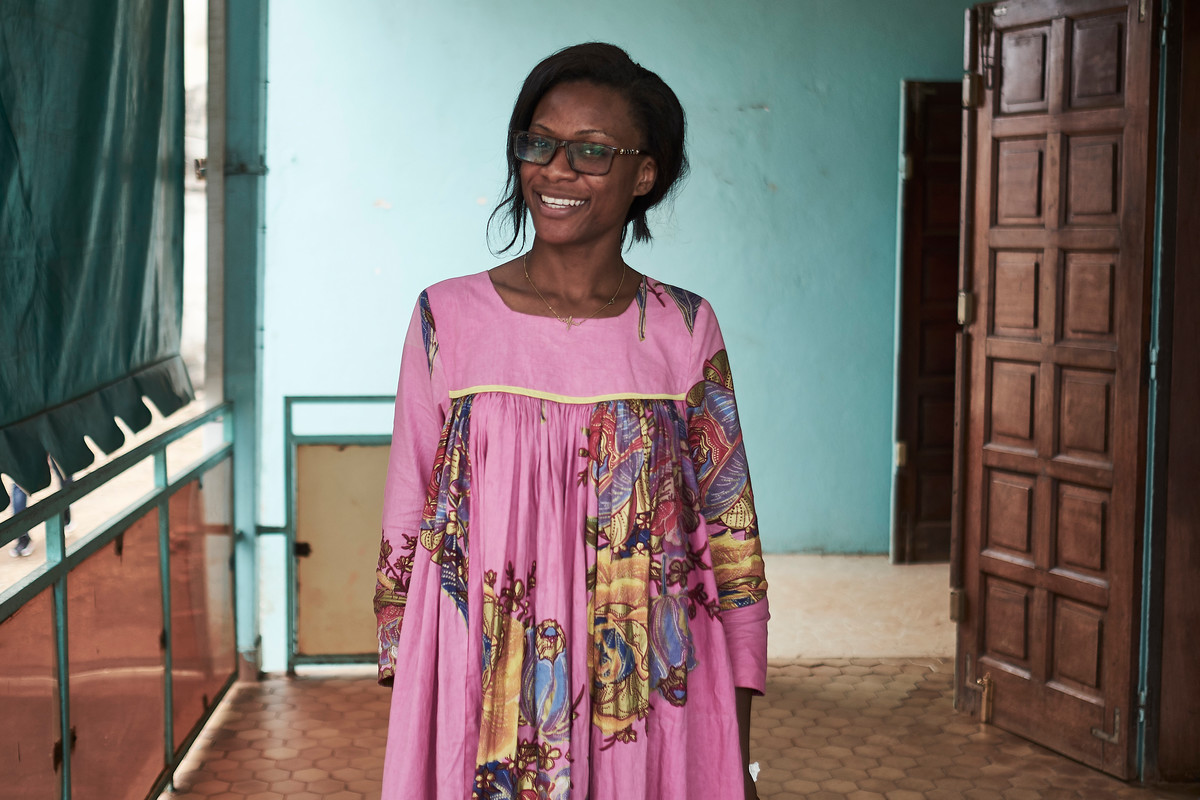
IPPF’s Medical Abortion Commodities Database: one year on
Launched nearly a year ago today, IPPF’s Medical Abortion Commodities Database is filling a knowledge gap and helping those working on safe abortion identify quality products to use in healthcare programmes and to inform policy. People in 79 countries around the world have used the site since its launch. Globally, an estimated 25 million unsafe abortions occur every year, with 97 per cent of those in developing countries in Africa, Asia and Latin America, most with restrictive abortion laws. In the past decade, however, abortions have become safer, largely due to the increasing availability and use of medical abortion with mifepristone and misoprostol. Although medical abortion is most effective with a combined regimen of these two drugs, mifepristone is not as widely available as misoprostol, and many abortions are carried out safely using misoprostol only, often outside a clinical setting. Misoprostol is prone to rapid degeneration when exposed to humidity and moisture. There have been anecdotal and documented reports of poor quality misoprostol used in some settings, which can result in a range of complications including continued pregnancy, bleeding or retained products of conception. While the incidence of medical abortion is increasing, service providers and procurement personnel face challenges in knowing which misoprostol brands to procure for safe medical abortion at the country level. As a global advocate for and provider of safe and legal abortion services, IPPF partnered with Gynuity Health Projects and Concept Foundation, and collaborated with many other organizations working on safe abortion, to fill this knowledge gap. Together, we determined the country-level availability and quality of medical abortion commodities around the world and developed www.MedAb.org to house this important information. It is an easy-to-navigate website, where people can search by country, commodity type and/or brand name, from their desktops, tablets or smartphones. Only the misoprostol brands with sufficient evidence of quality are included on the site. The site launched with information on products in 89 countries. We have been updating it on an ongoing basis, often with the support and collaboration of other organizations, and the number of countries with information has increased to 97. This number will continue to grow in the coming months as we are working with Gynuity to collect and validate data from even more countries. Since the launch, we have added a graphic to illustrate the availability of medical abortion commodities in countries by income status. We will continue to add useful graphics to display information that can be used for policy and programming, including identifying where to invest resources and efforts to increase availability of quality medical abortion commodities.
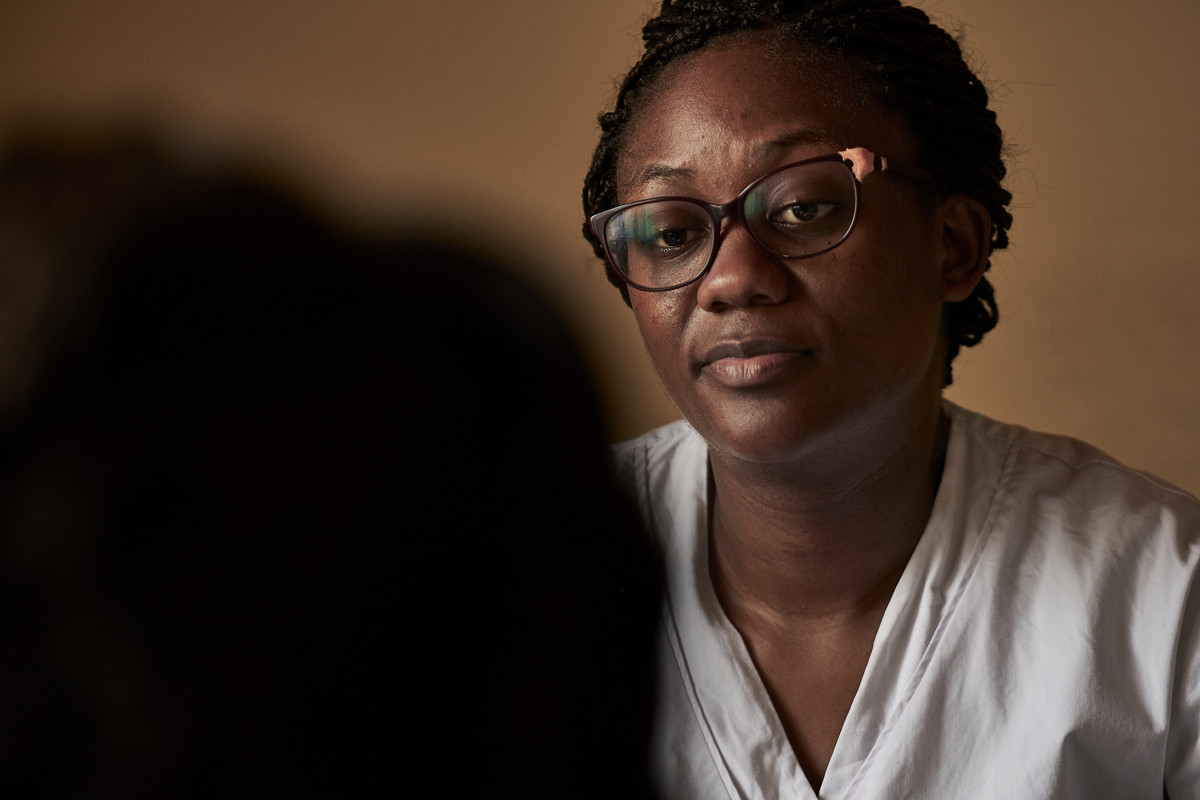
IPPF joint statement at HRC42
Co-sponsored by Catholics for Choice, Center for Health and Gender Equality (CHANGE), Center for Reproductive Rights, Centro de Promoción y Defensa de los Derechos Sexuales y Reproductivos (PROMSEX), CHOICE for Youth and Sexuality, Danish Family Planning Association (Sex og Samfund), DSW (Deutsche Stiftung Weltbevoelkerung), Fundación Mexicana para la Planeación Familiar, A.C. (Mexfam), ILGA World, International Women's Health Coalition (IWHC), International Campaign for Women's Right to Safe Abortion, International Planned Parenthood Federation (IPPF), IPPF/Africa Regional Office, Irish Family Planning Association, Le Planning Familiar, Mujer y Salud Uruguay (MYSU), Planned Parenthood Federation of American (PPFA), Plan International, Profamilia Colombia, Rutgers, Sex og Politikk, Sexual Rights Initiative (SRI), Swedish Association for Sexuality Education (RFSU), and Women's Link Worldwide. This year we celebrate the 25th anniversary of International Conference on Population and Development (ICPD) and its Program of Action (PoA), a landmark moment for human rights, where 179 countries recognized that reproductive rights are part of existing human rights, and marked a shift to a human rights-based approach to population and development policies, with a focus on ensuring health, equality, empowerment and rights for all while upholding the principles of non- violence, and non-discrimination. Critically, it recognized the centrality of the indivisible, interdependent, and interrelated nature of human rights to issues of population and sustainable development, in line with the UDHR and the Vienna Declaration. Since then, Member States have repeatedly reaffirmed their commitments to the ICPD PoA, including in the 2030 Agenda, and Treaty Monitoring Bodies (TMBs) have significantly built on the rights delineated in the PoA and furthered human rights standards pertaining to sexual and reproductive rights. However, while some progress in implementation has taken place, too much remains to be done. Therefore, we welcome the Nairobi Summit on ICPD+25 which will once again bring together Member States and different stakeholders to mobilize the political will and financial commitments urgently needed to implement the ICPD Agenda, putting the voices and rights of women and girls at the center of conversations, and meet the 3 zeros: zero gender-based violence, zero unmet need for family planning, and zero preventable maternal deaths. As we approach September 28th, the International Safe Abortion Day, whose theme for 2019 is “abortion is healthcare,” we cannot ignore that legal and policy barriers to safe abortion make unsafe abortion one of the global leading causes of maternal mortality*, which in most cases are preventable if all people, especially women and adolescents, have access to safe, legal abortion. Let’s not deny the evidence: safe abortion saves lives. If Member States are serious about ending maternal mortality, the legal, policy, social, cultural and economic barriers to access safe abortion must be addressed. We urge all Member States to make meaningful, measurable national commitments in Nairobi to increase access to safe and legal abortion, in accordance with their legal obligations under international human rights law, in an effort to reach zero preventable maternal deaths, and to commit to report on progress in its implementation. (*Lisa B Haddad, MD, MA, and Nawal M Nour, MD, MPH, Unsafe Abortion: Unnecessary Maternal Mortality, Rev Obstet Gynecol. 2009 Spring; 2(2): 122–126, https://www.ncbi.nlm.nih.gov/pmc/articles/PMC2709326/; Su Mon Latt, Allison Milner & Anne Kavanagh, Abortion laws reform may reduce maternal mortality: an ecological study in 162 countries, BMC Women's Health 2019 19(1) https://bmcwomenshealth.biomedcentral.com/articles/10.1186/s12905-018-0705-y. See also Medecins Sans Frontiers, 2019 Unsafe abortion: a forgotten emergency, https://www.msf.org/unsafe-abortion-forgotten-emergency-womens-health; Susheela Singh, Lisa Remez, Gilda Sedgh, Lorraine Kwok and Tsuyoshi Onda, Guttmacher Institute, Abortion Worldwide 2017: Uneven Progress and Unequal Access (2018) https://www.guttmacher.org/report/abortion-worldwide-2017)







